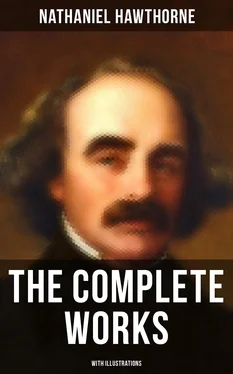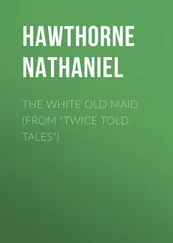So this oddly composed little social party used to assemble under the ruinous arbor. Hepzibah — stately as ever at heart, and yielding not an inch of her old gentility, but resting upon it so much the more, as justifying a princesslike condescension — exhibited a not ungraceful hospitality. She talked kindly to the vagrant artist, and took sage counsel — lady as she was — with the wood-sawyer, the messenger of everybody’s petty errands, the patched philosopher. And Uncle Venner, who had studied the world at street-corners, and other posts equally well adapted for just observation, was as ready to give out his wisdom as a town-pump to give water.
“Miss Hepzibah, ma’am,” said he once, after they had all been cheerful together, “I really enjoy these quiet little meetings of a Sabbath afternoon. They are very much like what I expect to have after I retire to my farm!”
“Uncle Venner” observed Clifford in a drowsy, inward tone, “is always talking about his farm. But I have a better scheme for him, by and by. We shall see!”
“Ah, Mr. Clifford Pyncheon!” said the man of patches, “you may scheme for me as much as you please; but I’m not going to give up this one scheme of my own, even if I never bring it really to pass. It does seem to me that men make a wonderful mistake in trying to heap up property upon property. If I had done so, I should feel as if Providence was not bound to take care of me; and, at all events, the city wouldn’t be! I’m one of those people who think that infinity is big enough for us all — and eternity long enough.”
“Why, so they are, Uncle Venner,” remarked Phoebe after a pause; for she had been trying to fathom the profundity and appositeness of this concluding apothegm. “But for this short life of ours, one would like a house and a moderate garden-spot of one’s own.”
“It appears to me,” said the daguerreotypist, smiling, “that Uncle Venner has the principles of Fourier at the bottom of his wisdom; only they have not quite so much distinctness in his mind as in that of the systematizing Frenchman.”
“Come, Phoebe,” said Hepzibah, “it is time to bring the currants.”
And then, while the yellow richness of the declining sunshine still fell into the open space of the garden, Phoebe brought out a loaf of bread and a china bowl of currants, freshly gathered from the bushes, and crushed with sugar. These, with water, — but not from the fountain of ill omen, close at hand, — constituted all the entertainment. Meanwhile, Holgrave took some pains to establish an intercourse with Clifford, actuated, it might seem, entirely by an impulse of kindliness, in order that the present hour might be cheerfuller than most which the poor recluse had spent, or was destined yet to spend. Nevertheless, in the artist’s deep, thoughtful, all-observant eyes, there was, now and then, an expression, not sinister, but questionable; as if he had some other interest in the scene than a stranger, a youthful and unconnected adventurer, might be supposed to have. With great mobility of outward mood, however, he applied himself to the task of enlivening the party; and with so much success, that even dark-hued Hepzibah threw off one tint of melancholy, and made what shift she could with the remaining portion. Phoebe said to herself, — ”How pleasant he can be!” As for Uncle Venner, as a mark of friendship and approbation, he readily consented to afford the young man his countenance in the way of his profession, — not metaphorically, be it understood, but literally, by allowing a daguerreotype of his face, so familiar to the town, to be exhibited at the entrance of Holgrave’s studio.
Clifford, as the company partook of their little banquet, grew to be the gayest of them all. Either it was one of those up-quivering flashes of the spirit, to which minds in an abnormal state are liable, or else the artist had subtly touched some chord that made musical vibration. Indeed, what with the pleasant summer evening, and the sympathy of this little circle of not unkindly souls, it was perhaps natural that a character so susceptible as Clifford’s should become animated, and show itself readily responsive to what was said around him. But he gave out his own thoughts, likewise, with an airy and fanciful glow; so that they glistened, as it were, through the arbor, and made their escape among the interstices of the foliage. He had been as cheerful, no doubt, while alone with Phoebe, but never with such tokens of acute, although partial intelligence.
But, as the sunlight left the peaks of the Seven Gables, so did the excitement fade out of Clifford’s eyes. He gazed vaguely and mournfully about him, as if he missed something precious, and missed it the more drearily for not knowing precisely what it was.
“I want my happiness!” at last he murmured hoarsely and indistinctly, hardly shaping out the words. “Many, many years have I waited for it! It is late! It is late! I want my happiness!”
Alas, poor Clifford! You are old, and worn with troubles that ought never to have befallen you. You are partly crazy and partly imbecile; a ruin, a failure, as almost everybody is, — though some in less degree, or less perceptibly, than their fellows. Fate has no happiness in store for you; unless your quiet home in the old family residence with the faithful Hepzibah, and your long summer afternoons with Phoebe, and these Sabbath festivals with Uncle Venner and the daguerreotypist, deserve to be called happiness! Why not? If not the thing itself, it is marvellously like it, and the more so for that ethereal and intangible quality which causes it all to vanish at too close an introspection. Take it, therefore, while you may. Murmur not, — question not, — but make the most of it!
Table of Contents
FROM the inertness, or what we may term the vegetative character, of his ordinary mood, Clifford would perhaps have been content to spend one day after another, interminably, — or, at least, throughout the summertime, — in just the kind of life described in the preceding pages. Fancying, however, that it might be for his benefit occasionally to diversify the scene, Phoebe sometimes suggested that he should look out upon the life of the street. For this purpose, they used to mount the staircase together, to the second story of the house, where, at the termination of a wide entry, there was an arched window, of uncommonly large dimensions, shaded by a pair of curtains. It opened above the porch, where there had formerly been a balcony, the balustrade of which had long since gone to decay, and been removed. At this arched window, throwing it open, but keeping himself in comparative obscurity by means of the curtain, Clifford had an opportunity of witnessing such a portion of the great world’s movement as might be supposed to roll through one of the retired streets of a not very populous city. But he and Phoebe made a sight as well worth seeing as any that the city could exhibit. The pale, gray, childish, aged, melancholy, yet often simply cheerful, and sometimes delicately intelligent aspect of Clifford, peering from behind the faded crimson of the curtain, — watching the monotony of everyday occurrences with a kind of inconsequential interest and earnestness, and, at every petty throb of his sensibility, turning for sympathy to the eyes of the bright young girl!
If once he were fairly seated at the window, even Pyncheon Street would hardly be so dull and lonely but that, somewhere or other along its extent, Clifford might discover matter to occupy his eye, and titillate, if not engross, his observation. Things familiar to the youngest child that had begun its outlook at existence seemed strange to him. A cab; an omnibus, with its populous interior, dropping here and there a passenger, and picking up another, and thus typifying that vast rolling vehicle, the world, the end of whose journey is everywhere and nowhere; these objects he followed eagerly with his eyes, but forgot them before the dust raised by the horses and wheels had settled along their track. As regarded novelties (among which cabs and omnibuses were to be reckoned), his mind appeared to have lost its proper gripe and retentiveness. Twice or thrice, for example, during the sunny hours of the day, a water-cart went along by the Pyncheon House, leaving a broad wake of moistened earth, instead of the white dust that had risen at a lady’s lightest footfall; it was like a summer shower, which the city authorities had caught and tamed, and compelled it into the commonest routine of their convenience. With the water-cart Clifford could never grow familiar; it always affected him with just the same surprise as at first. His mind took an apparently sharp impression from it, but lost the recollection of this perambulatory shower, before its next reappearance, as completely as did the street itself, along which the heat so quickly strewed white dust again. It was the same with the railroad. Clifford could hear the obstreperous howl of the steam-devil, and, by leaning a little way from the arched window, could catch a glimpse of the trains of cars, flashing a brief transit across the extremity of the street. The idea of terrible energy thus forced upon him was new at every recurrence, and seemed to affect him as disagreeably, and with almost as much surprise, the hundredth time as the first.
Читать дальше












